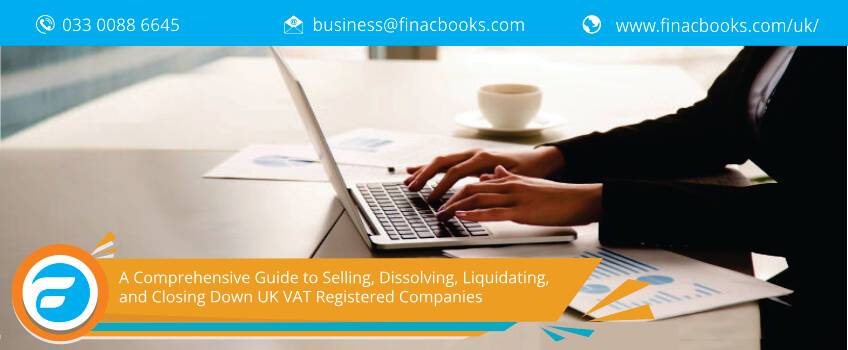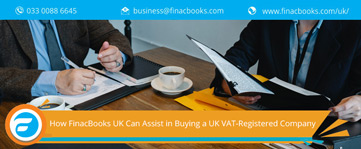If you're a business owner in the UK contemplating selling, dissolving, liquidating, or closing down your VAT registered company, it's crucial to understand the necessary steps and procedures involved. In this blog, we will provide you with a detailed guide on how to carry out these processes effectively. Additionally, we will highlight the role of FinacBooks, a trusted accounting firm, in assisting you throughout this journey.

Selling a VAT Registered Company
- Valuation: Determine the value of your business by assessing its assets, liabilities, and potential for future growth.
- Marketing: Create a comprehensive sales strategy, including marketing materials and reaching out to potential buyers.
- Negotiation and Due Diligence: Once you find a suitable buyer, engage in negotiations and perform due diligence to ensure a smooth transaction.
- Legal and Financial Considerations: Seek legal advice to draft and finalize the sale agreement, ensuring compliance with all relevant regulations.
Dissolving a VAT Registered Company
- Board Resolution: Obtain a board resolution stating the intention to dissolve the company and appointing a liquidator.
- Inform HMRC: Notify HM Revenue and Customs (HMRC) about your intention to dissolve the company and settle any outstanding tax liabilities.
- File the Appropriate Forms: Complete the necessary forms, such as DS01, and submit them to Companies House.
- Settle Outstanding Debts: Pay off any outstanding debts and ensure all financial obligations are fulfilled. >
- Official Gazette Publication: Publish a notice in the London Gazette to inform creditors and other interested parties of the company's dissolution.
Liquidating a VAT Registered Company
- Appoint a Liquidator: Hire a qualified liquidator to oversee the liquidation process and distribute the company's assets among creditors.
- Asset Valuation and Realization: Assess the company's assets and convert them into cash by selling off any tangible or intangible assets.
- Debt Settlement: Prioritize settling outstanding debts and liabilities, ensuring a fair distribution of funds among creditors.
- Final Accounts: Prepare final accounts, including a statement of affairs and a liquidator's report, to present to Companies House and creditors.
- Dissolution: Once the liquidation process is complete, apply for the company's dissolution with Companies House.
Closing Down a VAT Registered Company
- Inform HMRC: Notify HMRC about your intention to close down the company and settle any outstanding tax liabilities.
- File the Appropriate Forms: Complete the necessary forms, such as DS01, and submit them to Companies House.
- Settle Outstanding Debts: Ensure all outstanding debts and financial obligations are settled before closing down the company.
- Inform Employees and Stakeholders: Communicate the decision to close down the business with your employees, suppliers, clients, and other stakeholders.
- Final Accounts and Tax Returns: Prepare final accounts and file the necessary tax returns with HMRC before closing down the company.
How FinacBooks Can Help
Throughout these processes, FinacBooks can provide invaluable assistance, ensuring a smooth and efficient transition for your VAT registered company. Here are some ways they can help:
- Professional Guidance: FinacBooks has a team of experienced experts who can provide you with step-by-step guidance, ensuring compliance with legal and financial requirements.
- Accounting and Tax Support: They can help you settle outstanding debts, handle tax matters, and prepare final accounts and tax returns accurately.
- Legal Compliance: FinacBooks can assist you in navigating through complex legal procedures, ensuring all necessary documents are filed correctly and on time.
- Peace of Mind: With FinacBooks by your side, you can focus on other aspects of transitioning or starting a new venture, knowing that your company's dissolution or closure is being handled efficiently.
Selling, dissolving, liquidating, or closing down a VAT registered company in the UK involves multiple steps and legal obligations. By following the outlined procedures and seeking assistance from experts like FinacBooks, you can ensure a seamless transition while complying with all legal and financial requirements. Remember, seeking professional guidance is crucial to avoid any pitfalls and to make the process as smooth as possible.
Any Questions? Request a callback from our Tax Experts.


































